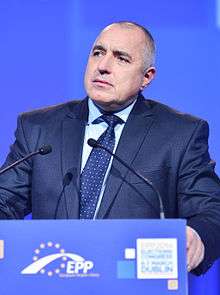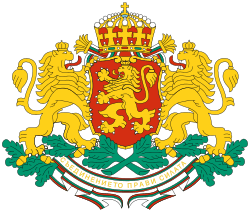First Borisov Government
| First Borisov Government | |
|---|---|
|
87 cabinet of Bulgaria | |
 | |
| Date formed | 27 July 2009 |
| Date dissolved | 21 February 2013 |
| People and organisations | |
| Head of government | Boyko Borisov |
| Deputy head of government |
See list
|
| Head of state |
Georgi Parvanov (2009-2012) Rosen Plevneliev (2012-2013) |
| Member party | GERB |
| Status in legislature | Minority Government |
| History | |
| Election(s) | 2009 |
| Legislature term(s) | 41st National Assembly |
| Incoming formation | Government formation |
| Outgoing formation | Resignation |
| Predecessor | Stanishev Government |
| Successor | Raykov Government (Provisional) |
The eighty-seventh Cabinet of Bulgaria (in office from July 27, 2009 to March 13, 2013) was a minority government chaired by Boyko Borisov. The government was formed after Borisov's party, GERB, won the 2009 parliamentary election. It remained in power relying on support from the opposition parties for almost four years before resigning following nationwide protests.
Cabinet
Original Composition
- ↑ Responsible for Bulgarian citizens abroad.
Changes in November, 2009
Following the election of Yordanka Fandakova as mayor of Sofia, she was released from the post of Minister of Education and Science on November 19, 2013. She was replaced by Sergei Ignatov, her former Deputy Minister.
Changes in 2010
Changes in January
Following the resignation of Rumiana Jeleva from the post of Minister of Foreign Affairs the following cabinet shuffle took place on January 27:
- Incumbent Minister of Defence, Nikolay Mladenov, was moved to Foreign Affairs.
- Anyu Angelov, former Deputy, was promoted to Minister of Defense.
Changes in March
On the 18th of March Tomislav Donchev was appointed Minister without portfolio, responsible to administer the relief funds from the European Union.[3]
Changes in April
On the 21st of April Anna-Maria Borisova (an independent up to that point) was appointed Minister of Health after the dismissal of Bozhidar Nanev.
Changes in September
On September 29 the most recent addition to cabinet, Borisova, resigns, and is succeeded by Stefan Konstantinov.
Changes in December
On December 20, Bozhidar Dimitrov tenders his resignation, effective February 4, 2011. No successor was chosen.
Changes in 2011
Changes in May
Aleksandar Tsvetkov resigned from his post on May 18 and was succeeded by Ivaylo Moskovski.
Changes in September
Having won his party's nomination for the 2011 presidential election three days earlier, Rosen Plevneliev resigns as Minister of Regional Development and Public Works on September 7. He was replaced by Lilyana Pavlova. Margarita Popova, having been nominated for candidate for vice-president for the election, stepped down from her position as Minister of Justice. On November 30, Diana Kovacheva was approved by the National Assembly to take up her portfolio.
Changes in March, 2012
On 21 March the Minister of Economy and Energy, Traycho Traykov, resigned. He was replaced by Delyan Dobrev.
Minister of Health Stefan Konstantinov, who was being criticized by his own party for failing to deal with the increase in drug prices, resigns. Konstantinov, defending himself, said that the lack of support from the ruling party was impeding the implementation of reforms that he claims were leading to improved healthcare. Desislava Atanasova was his chosen successor.
Changes in January 2013
On January 28, 2013, the Prime Minister fired Sergei Ignatov after a review on the Bulgarian National Science fund, carried out by the Inspectorate General of the Council of Ministers, confirmed mounting reports of ministerial mismanagement, including the hiring of unqualified people to the ministry and corruption in the granting process, over the past few months. The review was triggered by complaints from the Bulgarian Academy of Sciences and Sofia University that the fund was used to funnel millions of levs to unsound projects ignoring the merits of more worthy proposals.[4] On February 6, Academician Stefan Vodenicharov was sworn is as the new Minister of Education and Science.
Resignation
On February 20, 2013 the Borisov government offered its resignation. Parliament accepted the resignation the next morning with 209 MPs voting "for" and 5 "against" with 1 abstention.[5] The move came after nationwide protests demanded it step down. The protests started earlier in the year over monopolies in the energy sector, which have resulted in increasing costs to the consumer. Austerity measures, unemployment and corruption were also reasons given by demonstrators for their discontent.
On March 13, 2013 a provisional government was set up, chaired by Marin Raykov, and the parliamentary elections were moved up.
See also
References
- ↑ Бончева, Лили. "Ясен е кабинетът". Econ.bg. Retrieved 2 February 2014.
- ↑ Although a member of the cabinet, Djankov was not a member of the ruling party GERB. "Bulgaria Finance Minister Rejects Presidential Bid Rumors". Domestic Politics. Sofia News Agency. Retrieved 1 February 2014.
- ↑ Sabotinova, Maria. "Tomislav Donchev appointed Bulgarian minister for EU funds". The Sofia Echo. Sofia Echo Media Ltd. Retrieved 4 February 2014.
- ↑ Grant, Bob. "Bulgarian Science Minister Fired". The Scientist. LabX Media Group. Retrieved 1 February 2014.
- ↑ "Bulgaria's Parliament Accepts Government Resignation". MinWashingtonNews. Retrieved 31 January 2014.
